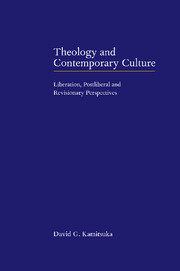Book contents
- Frontmatter
- Contents
- Acknowledgments
- Introduction
- 1 Values informing conceptions of theology
- 2 Apologetics and the linguistic-historical turn
- 3 Credibility in the pluralistic public realm
- 4 Reading the Bible theologically as the church's book
- 5 Pursuing doctrinal common ground
- 6 Virtues and vices in theological practice
- Select bibliography
- Index
5 - Pursuing doctrinal common ground
Published online by Cambridge University Press: 29 September 2009
- Frontmatter
- Contents
- Acknowledgments
- Introduction
- 1 Values informing conceptions of theology
- 2 Apologetics and the linguistic-historical turn
- 3 Credibility in the pluralistic public realm
- 4 Reading the Bible theologically as the church's book
- 5 Pursuing doctrinal common ground
- 6 Virtues and vices in theological practice
- Select bibliography
- Index
Summary
The previous chapter proposes that a regulative approach to doctrine provides an effective way of identifying Christian intercommunal continuity. In this chapter, I will test that proposal by using rule theory to adjudicate between two specific constructive theological proposals which are apparently at a doctrinal impasse. This issue brings us to the perimeter of the methodological territory within which I have been moving in this book. Traversing those borders is highly appropriate because it allows us to get a sense of how the kinds of methodological issues discussed so far can have a positive impact on clarifying actual doctrinal disputes. Specifically, I will focus on Stanley Hauerwas's criticisms of Gutierrez's concept of liberation. There are two reasons why it is illuminating to recast this postliberal–liberation theological debate. First, his critique of Gutiérrez seems to have left the impression that there are few points of significant doctrinal common ground between the two movements. This impression merits serious review in light of the way postliberal theology has evolved in the years following the publication of Lindbeck's The Nature of Doctrine and in light of the intermovement methodological compatibilities we have seen in previous chapters. It is not a stretch of the imagination to envision constructive theological exchange between postliberals and liberationists holding promise for both – even assuming that materially different theological formulations will arise due, in part, to their involvement with such different socio-religious contexts. Second, since liberation theology's widening dissemination in North Atlantic theological and ecclesial circles in the past decade, it has been the subject of numerous critical evaluations, which Hauerwas's views to some extent reflect.
- Type
- Chapter
- Information
- Theology and Contemporary CultureLiberation, Postliberal and Revisionary Perspectives, pp. 148 - 172Publisher: Cambridge University PressPrint publication year: 1999



